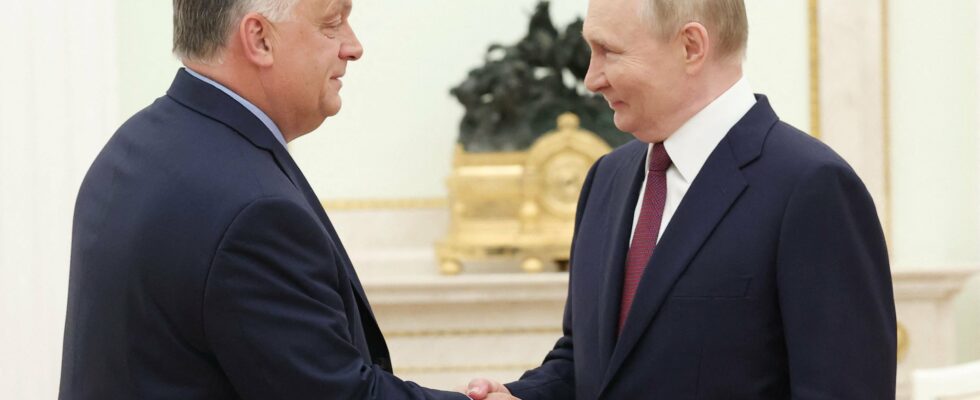Three days after visiting Kiev for the first time since the start of the war in Ukraine, Viktor Orban has once again been Viktor Orban: a surprise visit to Moscow, without consultation with other European countries, hammering home once again his desire to “establish peace”.
As Hungary took over the rotating presidency of the EU Council, this visit sparked frosty reactions within the European Union, which was keen to stress that Viktor Orban was in no way a representative of the Union’s positions. For its part, Russia welcomed the visit of the Hungarian leader, a long-time supporter of the Moscow regime. Vladimir Putin took the opportunity to reiterate his conditions for peace: a capitulation of Ukraine. A look back at the main statements to remember from this meeting.
Orban says he can be “an instrument in the service of God”
“Many steps to take” to “end the war” in Ukraine and “establish peace”. This is how Viktor Orban summed up his meeting with Vladimir Putin. “I noted that the positions are very far apart”, he added in front of journalists, alongside the Russian president. “But for the reestablishment of dialogue, the first important step was taken today and I will continue this work”, assured the Hungarian Prime Minister.
According to the Kremlin, Budapest had proposed this visit on Wednesday, the day after the Hungarian Prime Minister’s visit to Ukraine, a country with which it has difficult relations, particularly due to its pro-Russian stance.
In Moscow, Viktor Orban once again confirmed his desire to assert himself as a mediator between Ukraine and Russia, despite kyiv’s refusal to negotiate on the Kremlin’s terms and the firm and united position desired by the European Union. “The number of countries that can speak to both sides of the war is decreasing. Hungary is gradually becoming the only country in Europe that can speak to everyone,” said the Hungarian Prime Minister, while he had defended, before his visit, being able to be “an instrument in the service of God and those who want peace.”
Vladimir Putin’s satisfaction
For his part, Vladimir Putin was obviously pleased with Viktor Orban’s visit to Moscow. “I understand that this time, you have come not only as a long-standing partner, but also as President of the Council” of the European Union, the Russian president said, while the EU had warned that Viktor Orban did not have a European mandate. “I expect you to tell me your position (on Ukraine) and that of the European partners,” he added before their meeting.
Referring to a “frank and useful” discussion in order to “resolve the crisis” in Ukraine, the Russian president recalled that he had already announced in June his vision of peace, “namely the total withdrawal of all Ukrainian soldiers from the people’s republics of Donetsk and Lugansk and the regions of Zaporizhia and Kherson”, as well as a renunciation of his alliance with the West. De facto, therefore, a demand for capitulation.
A visit that causes discomfort in Europe and the West
In Europe, this visit by the Hungarian Prime Minister has obviously provoked more than mixed reactions. The head of European diplomacy, Josep Borrell, recalled that Viktor Orban “does not represent the EU in any way”.
Charles Michel, the president of the European Council, which brings together the leaders of the Twenty-Seven, had reacted on Thursday evening to the announcement of this trip. “The rotating presidency of the EU has no mandate to engage in dialogue with Russia on behalf of the EU,” he wrote on X, insisting that for the 27, “Russia is the aggressor, Ukraine is the victim” and that “no discussion can take place without Ukraine.” The same slogan was used by the president of the European Commission, Ursula von der Leyen, who recalled on X that the temptation of “appeasement will not stop Putin” and that “only unity and determination will open the way to a complete, just and lasting peace in Ukraine.”
Olaf Scholz, for his part, was keen to stress that the European Union’s support for Ukraine would not weaken. The German Chancellor also recalled that Viktor Orban was not representing the EU during this visit, stressing that the “clear message from the Union is that Ukraine can count on our solidarity.”
NATO, finally, also wanted to distance itself from this controversial visit. “Of course, Viktor Orban does not represent NATO at these meetings, he represents his own country,” declared the Secretary General of the organization, Jens Stoltenberg, to the press, stressing however that the Atlantic Alliance had been “informed” of this trip. “What matters is that I expect Hungary to subscribe to NATO’s decisions,” he insisted, recalling that the countries of the Alliance have all “condemned the Russian invasion, supported the territorial integrity and sovereignty of Ukraine, and expressed very clearly that Russia is responsible for this war, that Russia is the aggressor.”
kyiv’s anger
Ukrainian diplomacy, for its part, castigated the visit “without any agreement or coordination” with kyiv of Prime Minister Viktor Orban to Moscow to discuss Ukraine with Vladimir Putin. “We recall that for our country, the principle ‘no agreement on Ukraine without Ukraine’ remains inviolable,” the ministry hammered home in its press release.
During his visit to kyiv, Viktor Orban had already judged that Ukraine should accept a ceasefire. A position however swept aside by the West and Ukrainians, kyiv demanding the withdrawal of Russian troops and respect for its territorial integrity.
